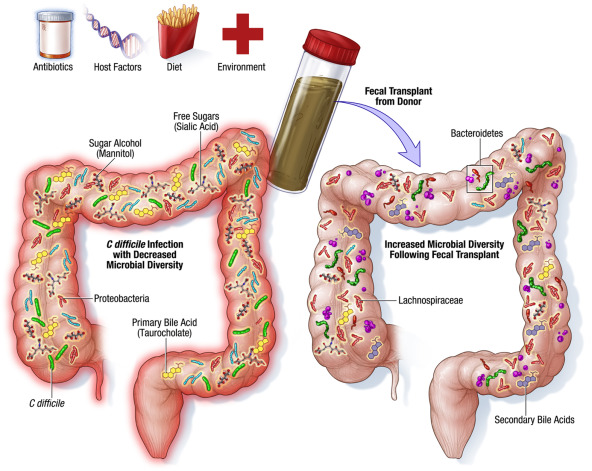Laurie's Blogs.
Dec 2018
Lend me your poop!

Sometimes the inspiration for a blog is gifted to you by the week’s events. Such is the case with this blog. Just for fun, and out of left field, I bring you a discussion about Fecal Microbiota Transplantation (FMT)! I’m not even kidding! This week I had a patient come in who had recently received a Fecal Transplant! He’s a senior dog with some gut issues… and the specialist he goes to recommended that they try it!
So, the story goes… Ben the 9-year-old Leonberger-X received the poop of one of the clinic veterinarian’s dog. Great poop! Full of microbes and good things because the vet’s dog eats horse poop. In order to make space for the poop and provide more ‘goodness’, they first inserted 3 ‘vials’ of ozone into the large intestine via the rectum. This was followed by 3 equal sized vials of ‘donor poop’. Procedure complete.
Of course, I had questions. How long must the donor poop stay in place? Poor dog, did he not just rid himself of the foreign poop right away? The owner told me that they were instructed to keep the dog from pooping for as long as they were able. So, they didn’t walk him that evening, and they prevented him from going outside overnight. Apparently, he was asking to be let out! (Oh, man… I could do a whole stand-up comedy routine about this!!!) By morning… holding off letting him out for as long as possible, he was allowed to exit the domicile whereby he relieved himself of the foreigner’s poop. My client admitted to me that she wondered if it would look different. Alas, it did not!
And now, we all wait. Wait to see if it worked! This was only a week ago!
So, I decided to look at the research, and I found just a handful of papers… some however are open access on pubmed. I’ve included the links for you here:
Fecal microbiota transplantation in puppies with canine parvovirus infection
https://www.ncbi.nlm.nih.gov/pmc/articles/PMC5867004/
Commentary on key aspects of fecal microbiota transplantation in small animal practice
https://www.ncbi.nlm.nih.gov/pmc/articles/PMC6055767/
It is believed that the microbes in the gut act as a defense mechanism against enteropathogens, that regulate the immune system, digest complex fiberes, provide nutrition for enterocytes, and stimulate gastrointestinal motility. Various diseases have been associated with alterations in intestinal microbiota in a number of different species. Apparently, just a few studies have been done on this topic in dogs. Chronic diarrhea seems to be the main reason to undergo FMT. Most work in humans has involved recurrent Clostridium difficile infection, and FMT has resulted in high cure rates. Studies on dogs report encouraging results for the treatment of chronic diarrhea in dogs and the clinical response was consistent with significant changes in fecal microbiota after treatment. (Wow, those bugs must be fast at moving into their new neighbourhood!) Studies have also been conducted on puppies with parvovirus – again, showing positive results for the most part.
Donor selection and pre-poop screening protocols aren’t yet available, however a brain trust of veterinarians with an interest in gastroenterology have recommended the following exclusion list when selecting a donor: Animals that are in poor health, obese, and nonvaccinated against relevant infectious diseases, demonstrate clinical signs or have a history of GI disease, have a history of recent (past 3 months) antibiotic use, are atopic or food allergic, and/or are diagnosed or suspected of being infected with an enteropathogen, including bacteria, viruses, fungi, and parasites (both endo- and ectoparasites), should be excluded as potential fecal donors. (This is from the second paper linked to above.)
There is controversy on how one (or one’s dog) takes in the ‘healthy poop’. Options for poop receiving are via colonoscopy or rectal enema. There is also the option for nasoduodenal intubation and enteroscopy. The goal is for the feces to reach the large intestine, and some concerns have been raised about whether or not an ‘oral’ administration would allow for survival of the organisms through the stomach and small intestine. However, one human study found that oral capsules (you don’t want to be burping that day!) was not inferior to delivery via colonoscopy. So… good news there! https://www.ncbi.nlm.nih.gov/pmc/articles/PMC5820695/
But if that’s the case, then could we not just let these dogs out into the horse or cow pasture to munch away? I could make a fortune!!!!
Okay… so there is your topic of conversation for the week! You’re welcome!
Cheers! Laurie


